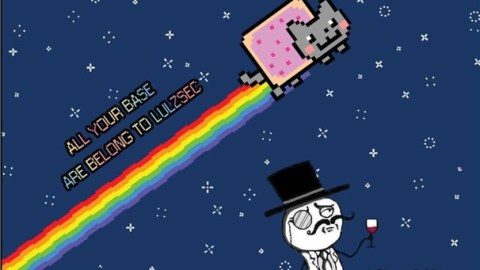The Day the Internet Shut Down. LOL.

On June 14, the day designated as Titanic Takeover Tuesday, a group of hackers known as LulzSec took down the website of the CIA, hacked into 62,000 email accounts and organized a telephone call-in request line for hackers to flood the phone lines of the FBI. And that’s just days after they hacked into the U.S. Senate website, took down the Sony PlayStation Network, defaced the PBS website and generally wreaked havoc on sites across the Internet. Unlike the hacktivist splinter group Anonymous, LulzSec makes no pretense of doing anything more than generally pranking the Internet – if you consider hacking into the official websites of the U.S. government a “prank.”
Lulz, of course, is the plural form of LOL, and typically gets translated as “just for kicks.” As in, “Hey, we just took down the CIA website. We did it for the lulz.” Or, “I just threw a pie in your face and slashed your car’s tires. Epic lulz.” While Anonymous takes on political and moral issues – like the arrest of WikiLeaks founder Julian Assange or the situation in Iran – with hacktivist-style interventions, LulzSec is more content to pull Ashton Kutcher-style Internet pranks and laugh about it with 180,000 of their closest Twitter followers. Decide for yourself: the unofficial symbol of Anonymous is the V for Vendetta mask, while the unofficial symbol of LulzSec looks like that cartoon Proust guy from Vanity Fair. (Or maybe it’s the Pringles guy? LOL.)
So what does it mean for the future of the Internet that LulzSec has been systematically pranking some of the world’s largest corporations and governments? Is it a “bad new world” for the Internet (as Sony CEO Howard Stringer put it) — a fateful sign that the Internet Kill Switch might be a lot easier to access than any of us ever thought? Or just some harmless pranks by a bunch of script kiddies with really powerful computers, looking for a few laughs and some attention from the world?
If you check out the LulzSec website, they announce their mission statement: to bring high-quality fun back to the Internet (at your expense, of course. LOL). Turn up the volume: there’s the theme from The Love Boat playing, and a painfully rudimentary-looking website. Seriously, governments are supposed to be afraid of these people? Are you laughing? Maybe, umm, that is, as long as your credit card data hasn’t been swiped, your email account info wasn’t made public, or your Sony PlayStation videogame wasn’t taken offline for days at a time.
Certainly, the U.S. government isn’t smiling, especially since any U.S. Senate hack could result in sensitive information being distributed to the Web. It’s also more than a bit embarrassing that our national intelligence folks – the guys who gave the greenlight to that whole DARPA Internet thing, are looking like The Internet Gang That Couldn’t Shoot Straight. Government officials claim that hackers such as LulzSec are in violation of Computer Fraud acts, and could land up to 20 years in federal prison. In Spain, the authorities rounded up and arrested a bunch of Anonymous hackers, tipped off by the V for Vendetta masks they left behind on their computers.
One thing is clear – the U.S. applauds when hacktivists and democratic activists take down the websites of anti-democratic governments in the Middle East. The applause is much less appreciative when that style of Internet activism extends into places like, well, Sweden. We fight against ham-fisted attempts to control the mythical Internet Kill Switch in Syria and Iran and China, but are eager to shut things down the moment that the hackers get a bit rambunctious at home. The Day the Internet Shut Down (aka #TitanicTakeoverTuesday) will be remembered as the day we lost our collective innocence on the Internet: The cute overloadLOL Cats sank on the Internet Titanic.





